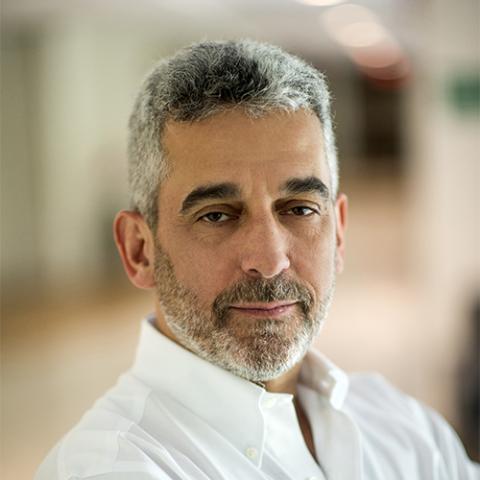Even after Octavia Nasr apologized for her ill-advised tweet" over the July 4 holiday expressing her "respect" for the recently deceased Mohammad Hussein Fadlallah, CNN fired its senior editor for Middle East affairs. And now bloggers and journalists are up in arms. Some are blaming the job action on "neoconservatives," which presumably includes THE WEEKLY STANDARD's Daniel Halper who commented on Nasr's "tweet" "here Israel Lobby author Stephen Walt writes that CNN's "spineless response" is "one more reason why mainstream journalism is increasingly seen as morally bankrupt."
Walt and some of the others have half a point--why is Nasr being singled out for openly expressing the U.S. media's default position on Hezbollah, Fadlallah's one-time colleagues? For instance, does anyone doubt that the New Yorker's Seymour Hersh "respects" the late cleric's even more vicious rival, Hezbollah General Secretary Hassan Nasrallah, whom he interviewed in the pages of the New Yorker?
The Western press delights in rattling the bourgeois sensibilities of its audience by showing the multifaceted aspects of Hezbollah--it's not just a militia with an appetite for slaughtering Jews, it's also a social welfare outfit that provides educational opportunities!--and even collaborates with the Party of God by publishing doctored photographs of Israeli "war crimes." The op-ed pages of America's dailies are replete with articles promoting Hezbollah's "pragmatism" and "moderation" (which also happens to be the position of the president's counter-terrorism czar John Brennan, and a recent CENTCOM analytical exercise), while reported pieces from Lebanon pass along Party of God press releases as objective analysis. If every U.S. journalist who quoted Hezbollah mouthpiece Amal Saad Ghorayeb as a respected "scholar" was fired, the bars of East Beirut would lose 25 percent of their business.
In Beirut, it's well understood that the U.S. press corps is at least deftly managed by Hezbollah and its pro-Syrian lapdogs, if not actively in the party's corner. First stop for most is Michel Samaha, Lebanon's former minister of Information, an apparatchik of the Damascus regime, who arranges interviews with Hezbollah higher-ups and other friends of the Islamic resistance. The only people who don't understand how the game is played in Lebanon are American media consumers, because the foreign desk editors back in the U.S. surely know what's up.
After all, if these editors were truly interested in objective reporting, heads would have rolled after last June's Lebanese parliamentary elections, which the U.S. press almost unanimously predicted were going to be won by the Hezbollah-led March 8 coalition. Curious editors from coast to coast might well have asked their Middle East correspondents and Beirut bureau chiefs how they were unable to discern what would become a victory for the opposing March 14 forces. Why did they all get it so wrong, or why weren't they at least getting polling numbers from the other side of the ballot in what turned out to be a relative drubbing for team Hezbollah's allies?
This is why a group of Lebanese colleagues and I decided to bring over delegations of American journalists during the last two years, so that there was at least someone listening to the other side. This infatuation with Hezbollah has been going on for years, and it's not just because the party established a formidable style of press criticism by kidnapping journalists back in the '80s. The U.S. media actually likes Hezbollah--it is an impressive thing, after all, to be able to kill your enemies--whether they are Jews or fellow Lebanese--whereas liberalism, non-violent resistance, rule of law, and opposition to political murder lacks sex appeal. Let's not forget that since the February 2005 assassination of former Prime Minister Rafik al-Hariri the U.S. media had tended to dismiss the Cedar Revolution as insufficiently authentic. The multi-sectarian coalition was not, in the eyes of most American journalists, made up of "real" Arabs, like Hezbollah; rather, it was a "Gucci" revolution.
This is the political milieu in which Nasr worked--and there's no upside to being a Lebanese Christian, as she is. Where Hezbollah is treated with equanimity, if not adulation, the Christian community is typically dismissed as politically retrograde and racist toward Muslims. In her blog post elaborating on why a Christian woman "respected" Fadlallah, Nasr explained how she had interviewed the cleric when she worked at the Lebanese Broadcasting Company (LBC), owned then by the Lebanese Forces, at the time the main Christian party. Today in the American press it is hard to find a reference to the LF without it being preceded by the modifier "right-wing"--the word the fashion-conscious U.S. media uses to ostracize its opponents.
Who knows if Nasr was overcompensating for the way her American colleagues perceive her confessional sect, or even what she meant by "respecting" Fadlallah. In the Middle East the bar is famously low--a religious figure who thinks it's wrong to mutilate women's genitalia is hailed as a progressive--and in Lebanon it's further skewed. Hassan Nasrallah is "respected" as a man of vision and probity, even as he hides in a bunker four years after dragging his country to war on behalf of Iran and Syria. On the other hand, Samir Geagea, the Christian leader of the Lebanese Forces, is despised even after he spent more than a decade in solitary confinement as the only militia leader to pay for his crimes during the Lebanese civil war rather than make his amends with the regime in Damascus.
Who knows what Octavia Nasr really thinks about Fadlallah, but it's hard to escape the conclusion that she fell prey to minority politics, twice over. As a Christian journalist working in a Muslim majority region, she imagined her profession of respect for a theorist of terror would win her bona fides as an "objective" reporter. And as an Arab she's taking the fall for a conviction held by virtually all of her Western professional peers.















